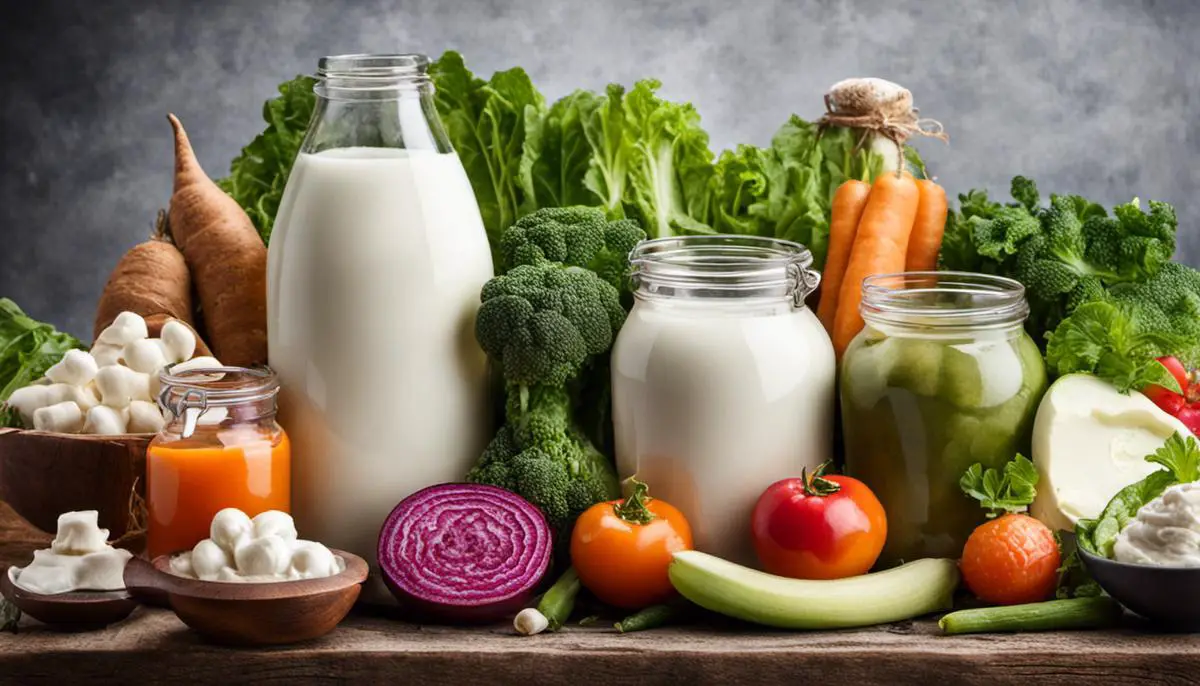Imagine having perpetual discomfort brewing in your stomach, affecting your daily life, curtailing activities you enjoy, essentially robbing you of a comfortable existence. A significant number of people deal with these symptoms daily, presented as Dyspepsia. This condition, commonly termed as indigestion, can be disheartening and disruptive. Treatment options may vary; however, the exploration of healthier, non-invasive solutions like probiotics provides a beacon of hope. Delving into the intriguing world of these ‘friendly bacteria,’ one uncovers a revelation that lies within our bodies, mitigating issues with stomach health and offering to reshape our lives.
Understanding Dyspepsia
Understanding Dyspepsia
Dyspepsia, commonly known as indigestion, is a widespread issue affecting approximately 15-30% of the general population worldwide. It consists of a collection of symptoms that often occur together in response to a disorder in the upper gastrointestinal tract. Common symptoms of dyspepsia include bloating, discomfort in the upper abdomen, excessive belching, and feelings of nausea.
Conventional Management of Dyspepsia
Traditionally, the management of dyspepsia may include lifestyle changes such as diet modifications, alcohol and caffeine reduction, and smoking cessation. Over-the-counter and prescribed medications like antacids, H2 blockers, or proton pump inhibitors (PPIs) may also be recommended to reduce stomach acid and provide relief. Often, it proves difficult to find the root cause of dyspepsia, and therefore, the treatment usually targets symptomatic relief.
Probiotics for Dyspepsia
In recent years, the potential benefits of probiotics for dyspepsia have gained significant attention. Probiotics are live bacteria and yeast that are beneficial for your health, especially your digestive system. Lactobacillus and Bifidobacterium are two of the most common types of probiotics recommended for gastrointestinal health.
Some studies have suggested that probiotics may improve dyspepsia symptoms by improving gut motility, enhancing the barrier function of the gastric mucosa, reducing gastric inflammation, and inhibiting pathogenic bacteria.
Clinical trials have shown that certain strains of probiotics can be useful in the management of functional dyspepsia. For example, a particular strain of Bifidobacterium, named Bifidobacterium longum BB536, decreased the fullness, bloating, and nausea scores in patients with functional dyspepsia in one study. Another study found that multi-strain probiotics led to greater symptom reduction and improved quality of life in dyspeptic patients compared to the placebo group.
While probiotics offer a promising adjunct treatment for dyspepsia, more extensive research needs to be done to define optimal strains and dosages. Furthermore, it’s important to consult a healthcare professional before starting any new supplement regimen.
Looking Ahead: The Potentially Revolutionary Role of Probiotics in Managing Dyspepsia
The blossoming field of human microbiome research, with its focus on health implications, is expected to redefine our understanding of probiotics’ role in dyspepsia management. These microbiota, which bear the potential to rewrite current treatment methodologies for this common condition, are creating new avenues for patient care. Future studies promise to illuminate the intricate interplay between the gut microbiota and dyspepsia, transforming our comprehension and way of addressing this prevalent health concern.

Introduction to Probiotics
Understanding Probiotics
Probiotics are none other than live bacteria and yeasts which bear benefits for the human body, predominantly functionally impacting the digestive tract. Because of their contributions to gut wellness, they are frequently labeled as “good” or “friendly” bacteria. Probiotics are not foreign to our bodies as they naturally exist within us, but they are also available through certain foods and dietary supplements.
How do Probiotics Function?
Probiotics restore the natural balance of gut bacteria. An imbalance often occurs when there are too many harmful bacteria and not enough beneficial ones. This imbalance can lead to digestive issues, allergies, mental health problems, weight gain, and other health ailments. Probiotics can assist in restoring this balance by outcompeting harmful bacteria, producing substances that inhibit harmful bacteria growth, and stimulating an immune response to fend off harmful bacteria.
Probiotic Sources
Aside from naturally occurring in the body, probiotics can be found in a variety of foods. Fermented foods, such as yogurt, kefir, sauerkraut, tempeh, and kimchi, are rich in beneficial bacteria, mainly Lactobacilli strains. Additionally, certain types of cheese including Gouda, mozzarella, cheddar, and cottage cheese contain Bifidobacteria. Dietary supplements, available in pills, capsules, or powders, also provide a concentrated source of probiotics.
How Probiotics Contribute to Gut Health
Probiotics are recognized for their widespread effects on the digestive health, specifically in relation to conditions such as dyspepsia or indigestion. Indigestion is typically marked by stomach discomfort, potential bloating, bouts of belching, feelings of nausea, and frequent heartburn.
Research and clinical trials have displayed the encouraging effects probiotics can have on indigestion symptoms. By boosting gut motility, the passage of contents through the digestive system, and increasing the rate of gastric emptying, probiotics can aid in reducing the likelihood of food accumulation in the stomach, ultimately causing pain. Additionally, by reducing inflammation in the stomach lining, probiotics contribute to an overall decrease in indigestion symptoms.
Those suffering from dyspepsia who included probiotics-rich foods or supplements into their diets reported notable improvements in their condition when compared to those who didn’t. It can be concluded that integrating probiotics into a daily diet can potentially serve as a supportive method in managing indigestion.

Probiotics and Dyspepsia
Deciphering Dyspepsia and Probiotics
Dyspepsia, or more widely known as indigestion, isn’t a disease itself, but a collective term used to outline the issues causing discomfort or pain in the upper abdomen. This discomfort could be the result of various gastrointestinal disorders including gastroesophageal reflux disease (GERD), peptic ulcer disease, or in some severe cases, stomach cancer. The tell-tale signs of this condition range from bloating and belching to experiencing a notable burning sensation.
In contrast, probiotics are beneficial strains of live bacteria and yeast that greatly assist our digestive systems. Commonly found in fermented foods such as yogurt and sauerkraut, they play a crucial role in balancing our gut microbiome and supporting healthy digestion. The most frequently encountered types include Lactobacilli, Bifidobacteria, and the yeast dubbed as Saccharomyces boulardii.
Probiotics’ Role in Alleviating Dyspepsia
Studies suggest that certain probiotics can help in managing dyspepsia. One study indicated that a particular strain of Lactobacillus reuteri significantly improved the symptoms and quality of life of dyspepsia patients. The premise is that these bacteria can positively influence gut microbiota, reducing inflammation, and promoting smooth gastrointestinal transit.
Furthermore, probiotics can strengthen the stomach lining and reduce inflammation, two factors frequently linked with dyspepsia. By balancing the gut microbiome, they can aid digestion and reduce symptoms like bloating and belching.
Current Scientific Evidence
Much of the current scientific literature indicates a positive correlation between probiotics and dyspepsia relief. A 2019 systematic review of nine trials, including more than 700 patients, concluded that probiotics could be an effective treatment for functional dyspepsia.
In a controlled study published in the Journal of Neurogastroenterology and Motility, researchers found that patients treated with multi-strain probiotics experienced a notable reduction in dyspepsia symptoms. Furthermore, some findings suggest that artichoke leaf extract combined with probiotics can provide improvements in functional dyspepsia.
Despite these promising results, it’s essential to highlight that the impact of probiotics on dyspepsia varies widely between different strains of bacteria used in the studies. The dosage and duration of treatment also play a significant role in effectiveness.
Side Effects and Risks
Probiotics are largely safe for most people, but they can cause mild side effects like bloating and gas, especially when you first start taking them. In rare cases, people with weakened immune systems or serious illnesses could suffer severe infections after consuming probiotics. Always consult with your healthcare provider before starting a new probiotic supplement routine.
Summary
Emerging evidence is suggesting probiotics, with their multitude of health benefits, may prove beneficial in managing dyspepsia symptoms. Probiotics appear to provide symptom relief while improving the overall quality of life for those suffering from this condition. As an added advantage, they could present a safer, long-term alternative to pharmacological treatments. However, it is important to note that the effectiveness of specific probiotics for dyspepsia is yet to be fully explored. As always, consulting with a healthcare professional should be your first step when considering dietary changes or additions like probiotics for the management of dyspepsia.

How to Incorporate Probiotics for Dyspepsia
Elucidating Dyspepsia and the Potential Role of Probiotics
Commonly referred to as indigestion, dyspepsia is a commonly occurring condition that manifests as consistent or recurring discomfort or pain in the upper section of the abdomen. Its origins can be traced to numerous factors such as the consumption of specific types of foods, particular lifestyle habits, or conditions like gastroesophageal reflux disease (GERD). Occasionally, dyspepsia may point towards a more serious underlying problem like stomach ulcers or gastritis.
Probiotics, often termed ‘good bacteria’, have shown potential in promoting digestion and maintaining overall gut health. As live microorganisms, they can yield significant health benefits when eaten in appropriate quantities. The premise of utilising probiotics in managing dyspepsia lies in their ability to restore balance to the gut biome, thereby relieving digestive discomfort.
Incorporating Probiotics through Dietary Changes
One of the most practical and effective ways to incorporate probiotics into your lifestyle for managing dyspepsia is through your diet. Many foods naturally contain probiotics.
Yogurt is a prime example, as it’s fermented with lactic acid bacteria which is a type of probiotic. Other fermented foods, like kimchi, sauerkraut, pickles, and kombucha also contain these beneficial bacteria.
Cheeses aged through fermentation, especially Gouda, mozzarella, cheddar, and cottage cheese have probiotics too. Also, sourdough bread and some types of beer contain a particular strain of probiotics called Saccharomyces boulardii.
Probiotic Supplements
While incorporating probiotic-rich foods into your diet is beneficial, sometimes food may not provide enough probiotics to alleviate dyspepsia symptoms. In this case, probiotic supplements can be a helpful addition to your regimen.
The market includes different types of probiotic supplements, from capsules to powders and even probiotic drinks. When choosing a probiotic supplement, pay close attention to the strains of bacteria it contains. The most common families of bacteria used in probiotics are Lactobacillus and Bifidobacterium, but within these families, there are numerous strains to choose from. Consult your doctor or a dietitian to identify the best probiotic strain for your needs.
Precautions When Using Probiotics
Although probiotics are generally safe to use, like any treatment, they should be used with caution. Some individuals may experience side effects such as bloating and gas, particularly when first starting a probiotic regimen.
If you have a weakened immune system, or if you’re seriously ill or undergoing treatment for a serious illness, you should always consult with your healthcare provider before starting any new treatment, including probiotics.
Additionally, it’s important to know that not all probiotics are created equal. The quality and effectiveness of probiotics can vary greatly from brand to brand. Therefore, it is essential to choose a trusted, reliable brand, preferably one recommended by a healthcare professional.
Remember that while probiotics may help to alleviate the symptoms of dyspepsia, they are not a cure-all and should be used as part of a holistic approach to managing the condition. This approach may also include dietary changes, stress management techniques, regular exercise, and where necessary, medication prescribed by a medical professional. Always speak with a healthcare provider before beginning any new health regimen.

So, as we sift through the myriad of resources available, let’s hone in on the effective and practical strategy of incorporating probiotics into our lives. We stand on the threshold of obtaining better control of our digestive health, predominantly that of dyspepsia, through informed decisions. It’s about understanding our bodies, the function of probiotics and the significant role they play. The path to ease from the clutches of dyspepsia could be as straightforward as implementing dietary changes, considering probiotic supplements, or incrementally incorporating probiotic-rich foods into our regular menu. The power of these ‘good’ bacteria echoes through multiple studies, reinforcing their potential effectiveness in managing dyspepsia, thereby potentially improving an individual’s quality of life. Health, as they say, is wealth, and taking proactive steps in managing a condition like dyspepsia is indeed an investment in your wellbeing.
